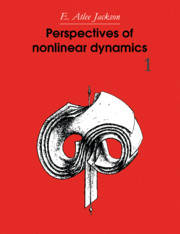Book contents
- Frontmatter
- Contents
- Preface
- Acknowledgements
- Concepts related to nonlinear dynamics: historical outline
- 1 In the beginning …
- 2 A potpourri of basic concepts
- 3 First order differential systems (n = 1)
- 4 Models based on first order difference equations
- 5 Second order differential systems (n = 2)
- Appendices
- Bibliography
- References by topics
- References added at 1991 reprinting
- Index
1 - In the beginning …
Published online by Cambridge University Press: 13 January 2010
- Frontmatter
- Contents
- Preface
- Acknowledgements
- Concepts related to nonlinear dynamics: historical outline
- 1 In the beginning …
- 2 A potpourri of basic concepts
- 3 First order differential systems (n = 1)
- 4 Models based on first order difference equations
- 5 Second order differential systems (n = 2)
- Appendices
- Bibliography
- References by topics
- References added at 1991 reprinting
- Index
Summary
… there was Poincaré
If modern nonlinear dynamics has a father, it is Henri Poincaré (1854–1912). Dynamic studies, prior to his studies in the 1880s, concentrated on obtaining analytic solutions of dynamic equations, as characterized by many astronomical investigations of planetary motions and by Lord Rayleigh's ubiquitous studies of nearly every moving mechanical system. Many great names in analysis are associated with these studies – Newton, Leibniz, Euler, Gauss, Lagrange, Laplace, Jacobi, Lie and, of course Poincaré, among others. One of the ‘grand problems’ of classical dynamics, whose solution had withstood the efforts of many people, was the gravitational three-body problem. While ten integrals of the motion for this system had long been known, all attempts to find any of the remaining eight integrals had ended in failure. In 1887 Bruns proved that the ten classic integrals are, in fact, the only algebraic integrals of this system. This was followed by Poincaré's more famous, and frequently misunderstood, theorem (1890) concerning the nonexistence of integrals which are analytic in a perturbation parameter (see Historical outline). Finally, Painlevé (1898) extended Bruns' theorem to N-bodies, and generalized the spatial possibilities. These theorems, which represent a turning point in the analysis of dynamic systems, are discussed in some detail by Whittaker (1944). One can say that the theorems represented a certain loss of innocence. No longer was there any hope of solving all dynamic systems in terms of indefinite integrals involving elementary functions and uniformly valid power series.
Information
- Type
- Chapter
- Information
- Perspectives of Nonlinear Dynamics , pp. 1 - 17Publisher: Cambridge University PressPrint publication year: 1989
Accessibility standard: Unknown
Why this information is here
This section outlines the accessibility features of this content - including support for screen readers, full keyboard navigation and high-contrast display options. This may not be relevant for you.Accessibility Information
- 1
- Cited by
